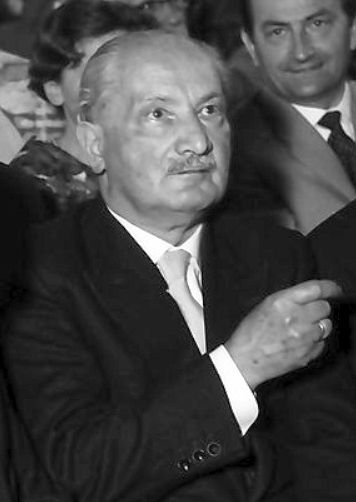Dzieło
Bycie i czas
Martin HeideggerMartin Heidegger słynne cytaty
„Umieć pytać znaczy: umieć czekać, nawet życie całe.”
Źródło: Bycie i czas
„Wiara, która nie jest stale wystawiana na możliwość niewiary, nie jest wiarą, ale zwykłą wygodą.”
Źródło: Wprowadzenie do metafizyki
Źródło: Richard H. Popkin, Avrum Stroll, Filozofia, Poznań 1994, s. 493, tłum. Jan Karłowski, Norbert Leśniewski, Andrzej Przyłębski.
Die Sprache ist das Haus des Seins. (niem.)
Źródło: Hanna Buczyńska-Garewicz, Milczenie i mowa filozofii, Wydawn. IFiS PAN, 2003, s. 17.
Martin Heidegger Cytaty o czasie
Źródło: Bycie i czas, PWN, Warszawa 1994, s. 530, tłum. Bogdan Baran.
Źródło: Bycie i czas, PWN, Warszawa 2013, s. 175, tłum. Bogdan Baran.
Martin Heidegger Cytaty o malarstwie
Czas światoobrazu
Źródło: s. 77, 78
Martin Heidegger cytaty
Źródło: Pytanie o technikę w: Technika i zwrot, Kraków 2002, s. 36, tłum. Janusz Mizera.
„Istota bytu ludzkiego zawarta jest w jego egzystencji.”
Źródło: Stefan Sarnowski, Zmierzch absolutu? Z problemów filozofii chrześcijańskiej i egzystencjalistycznej, PWN, Warszawa 1974, s. 117.
Źródło: Andrzej Przyłębski, Duch czy życie? Studia i szkice z filozofii niemieckiej, Wydawnictwo Naukowe WNS UAM, 2011, s. 193.
Martin Heidegger: Cytaty po angielsku
“Why are there beings at all, and why not rather nothing? That is the question.”
Warum ist überhaupt Seiendes und nicht vielmehr Nichts? Das ist die Frage.
What is Metaphysics? (1929), p. 110
Cf. Gottfried Leibniz, De rerum originatione radicali (1697)ː "cur aliquid potius extiterit quam nihil."
Źródło: Introduction to Metaphysics
“Making itself intelligible is suicide for philosophy.”
Contributions to Philosophy (From Enowning) [Beitrage Zur Philosophie (Vom Ereignis)], notes of 1936–1938, as translated by Parvis Emad and Kenneth Maly (1989)
Kontekst: Making itself intelligible is suicide for philosophy. Those who idolize "facts" never notice that their idols only shine in a borrowed light.
Kontekst: Those in the crossing must in the end know what is mistaken by all urging for intelligibility: that every thinking of being, all philosophy, can never be confirmed by "facts," ie, by beings. Making itself intelligible is suicide for philosophy. Those who idolize "facts" never notice that their idols only shine in a borrowed light. They are also meant not to notice this; for thereupon they would have to be at a loss and therefore useless. But idolizers and idols are used wherever gods are in flight and so announce their nearness.
“The most thought-provoking thing in our thought-provoking time is that we are still not thinking.”
Das Bedenklichste in unserer bedenklichen Zeit ist, dass wir noch nicht denken.
What is Called Thinking? [Was heisst Denken?] (1951–1952), as translated by Fred D. Wieck and J. Glenn Gray (1968)
Basic Questions of Philosophy: Selected "Problems" of "Logic" (Grundfragen der Philosophie: Ausgewählte "Probleme" der "Logik" (1984), translated by Richard Rojcewicz and André Schuwer, Indiana University Press, 1994, ISBN 0253004381, p. 7)
Źródło: Basic Writings: Martin Heidegger
Źródło: Nietzsche (1961), p. 127
“The human being is not the lord of beings, but the shepherd of Being.”
Letter on Humanism (1947)
The Principle of Reason (1955–1956) as translated by Reginald Lilly (1991) <!-- Bloomington: Indiana UP -->
Kontekst: The Geschick of being: a child that plays... Why does it play, the great child of the world-play Heraclitus brought into view in the aiôn? It plays, because it plays. The "because" withers away in the play. The play is without "why." It plays since it plays. It simply remains a play: the most elevated and the most profound. But this "simply" is everything, the one, the only... The question remains whether and how we, hearing the movements of this play, play along and accommodate ourselves to the play.
Interview (23 September 1966), published posthumously in Der Spiegel (31 May 1976), as translated by Maria P. Alter and John D. Caputo in The Heidegger Controversy : A Critical Reader (1991), edited by Richard Wolin.
Kontekst: Philosophy will not be able to effect an immediate transformation of the present condition of the world. This is not only true of philosophy, but of all merely human thought and endeavor. Only a god can save us. The sole possibility that is left for us is to prepare a sort of readiness, through thinking and poeticizing, for the appearance of the god or for the absence of the god in the time of foundering [Untergang] for in the face of the god who is absent, we founder. Only a God Can Save Us.
“Everywhere we remain unfree and chained to technology, whether we passionately affirm or deny it.”
The Question Concerning Technology (1954)
Kontekst: Everywhere we remain unfree and chained to technology, whether we passionately affirm or deny it. But we are delivered over to it in the worst possible way when we regard it as something neutral; for this conception of it, to which today we particularly like to do homage, makes us utterly blind to the essence of technology.
Źródło: Nietzsche (1961), p. 35
“The possible ranks higher than the actual.”
Introduction
Being and Time (1927)
Źródło: Nietzsche (1961), p. 70
Źródło: Nietzsche (1961), p. 19
